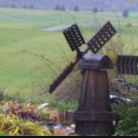
Blessings... those gifts given with no expectation of payback. They arrive unexpectedly from many sources… from our dear family and friends, from strangers we pass on our daily path, from a special moment in time, and all from our God above. Blessings convey love from the sender. They invoke inspiration as we face nature’s finest moments of grandeur. Given by our Creator God, blessings take our breath away as we pause in awe.
Blessings come in the simple form of a thankful heart when we’ve given to meet someone else’s need without expecting a reward…
Blessings come within the deep sense of pleasure for that special little something done as a random anonymous act of kindness and generosity to cheer another soul on their journey of life…
Blessings come specific to each person… for we are each created unique. My blessings are different from yours, and yours are different from those who you know. When we truly stop to think about it, we realize that all of life is a blessing. I remember the old hymn from my childhood, “Count your blessings, name them one by one. Count your blessings, see what God hath done…” But, in reality, I cannot even begin to count all my blessings nor to comprehend their great number. And that’s the key – understanding that all of life, from this entire world and universe down to our little life in and of itself, is a blessing in every way imaginable from our great and awesome God!
Blessings come with prayer and a thankful heart as we receive them from God. He, as creator of this universe and each of us within it, owes us nothing. Yet, He loved us so much, despite our disobedient ungrateful hearts, that “[He] shows his love for us in that while we were still sinners, Christ died for us. (Romans 5:8) We owe Him everything… every ounce of praise from our thankful heart… for from Him, we have life, even the air we breathe, and so much more which we take for granted every day… and from Him, we have our precious gift of eternal salvation that nothing can destroy.
And when we see our life and the world around us that way, we truly see our blessings with a grateful heart… ready to offer praise with thanksgiving to God for such awesome gifts in even the simplest of treasures. May you be blessed, today and always!!
Blessings
Linda A. Roorda
Like dawn awaking to a gentle rain
Are blessings showered upon our lives
From seemingly small to greatest of all
They are the simple, and yet not trivial.
We take a breath with no thought to the gift
Each second, each minute of every new day
Yet it’s a blessing we take for granted
With nary a thought as to the Giver.
From dawn to dusk the sun bathes our world
As our eyes behold the beauty around us
With its warming glow is our life enhanced
While we think naught from whence it came.
A whispered word of gentle praise
And loving concern expressed with feeling
Abilities shared with ease of talent
These, too, are blessings which touch deep the soul.
An act of kindness, random or thoughtful
Given from the heart is but a reflection,
An image of grace like that received
And bestowed in mercy by our Lord above.
Love from the heart, in tenderest form
Treasures each life we meet on our path,
To bless another aside from our wants
Enriches us both as God leads our way.
~
- Read more...
- 0 comments
- 394 views

